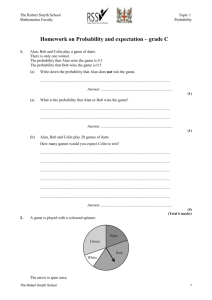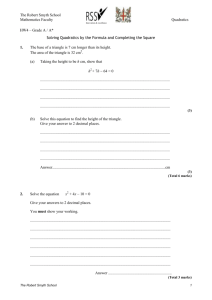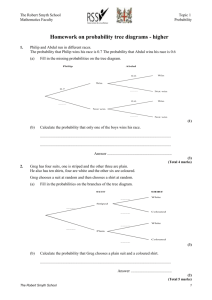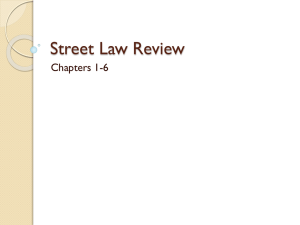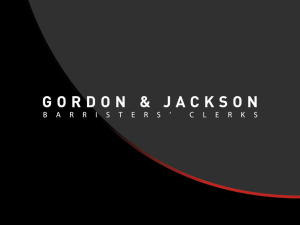Malpractice A Survival Guide for Anesthesia Providers
advertisement
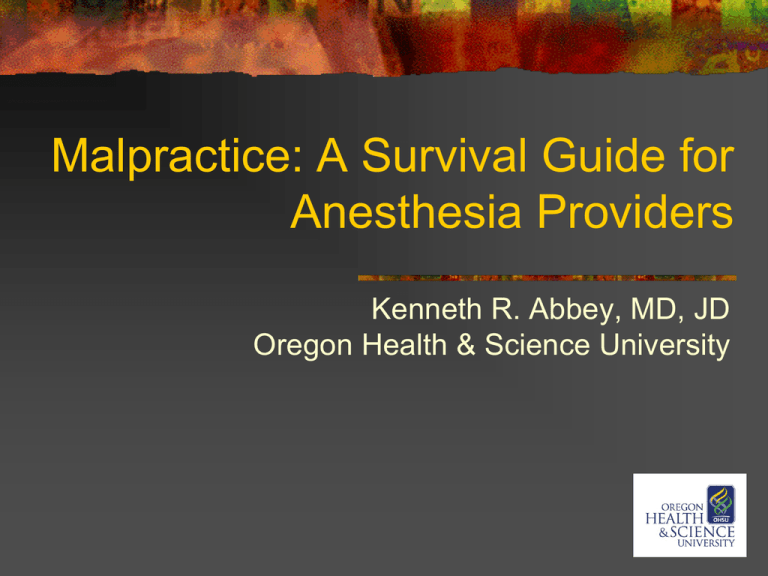
Malpractice: A Survival Guide for Anesthesia Providers Kenneth R. Abbey, MD, JD Oregon Health & Science University Disclosure and Learning Objectives Disclosure: I and my spouse/partner have no relevant financial relationships with any commercial interests to disclose. Learning objectives: Understand the basic elements of a malpractice claim Be able to describe the primary procedural steps in malpractice litigation Describe the goals and roles of plaintiff’s and defense counsel The Facts Pt, Mr. Bullish, is a 37 yo stockbroker who was involved in an MVA and has a femur fracture but is otherwise stable Anesthesia Preop Bullish and his wife, a doc, are in Trauma Bay 3 talking when you enter He tells you that he had a “bear of a day” and met his wife for happy hour where he had an ice water at 1730; it’s now 2330 h/o HTN, DM II on oral meds Exam shows easy airway, cleared c-spine Labs normal except for BAL of 0.10 In OR RSI with propofol, sux, cricoid Just before tube goes through the cords, cricoid is released Martini mixed with cheeseburger comes up the esophagus and goes down the trachea Desaturates to 80%, then stabilizes Case cancelled Pt to ICU on vent after bronch You meet with the family Wife, a surgeon, is understanding She tells you that in fact her husband had a cheeseburger with his martini. He didn’t tell you because he wanted surgery done. She knows from her practice that anesthesia providers are “alarmists” about this no eating before surgery stuff. She hugs you and thanks you for your empathy and care and says “no worries, he’ll be fine.” How to disclose a complication Principles of disclosure: let family know how patient is doing -- this is their first concern express your concern for your patient tell them the facts of the complication as best you know them (often not sure) tell them the likely consequences and the steps being taken to deal the the complication ask if they have any questions and answer them as best you can Can you apologize? ORS 677.082 states that for “any civil action against a person licensed by the Oregon Medical Board, any expression of regret or apology made by or on behalf of the person … does not constitute an admission of liability for any purpose.” POD 1: ICU Intensivist Cox has placed swann; pt on hifi vent, proned, FIO2 1.0 Mixed venous is 47% Pt arrests and expires Cox’s ICU note says: “Pt expired due to aspiration; this anesthesiologist, ‘Mary Ann,’ is a cowboy; will bring this to attention of QA committee. This needs to stop …“ “Listen here, newbie” … Dr. Bullish hires a lawyer … How will the plaintiff’s lawyer assess the case? x = (1/3P*MaxR – C) T Where: x = probable hourly recovery for the attorney P = probability of success at trial MaxR = maximum possible recovery C = attorney’s costs T = time in hours required by attorney to go to trial 6 Months Later, Letter Arrives … From Mr. Dewey of Dewey, Cheatham, and Howe Letter states: “My client, Dr. Bullish, hereby demands compensation for the wrongful death of her husband. Please remit $44.6 million immediately. If we do not receive payment within 30 days, we will commence suit. Have a nice day.”* * They never actually say “have a nice day.” Why the demand letter? Lawyer’s Rule: “you never know if you don’t ask” The best settlement in the world for a plaintiff’s attorney is the one made before he or she has to put any significant time into the case What do you do? Call Risk Management at your hospital Call and write (certified mail) to your claims adjuster for your malpractice insurer enclosing a copy of the demand letter. This satisfies the “notice requirement” of your policy. Duty to Defend What if a lawyer calls? What will your insurer do? Hire you a lawyer: John “white shoes” Smyth of Smyth, Smyth, and Jones 20 years out of HLS $575/hour Defense Attorney’s Assessment Will review chart, interview you, and have expert review Will weigh cost of defense against probable settlement value and policy limits and offer opinion to insurer Letter from Smyth to Dewey States: “My client denies any liability whatsoever, and we are prepared to vigorously defend this case. However, in the spirit of compromise, and to resolve this matter expeditiously, we would be willing to pay your client $50,000. This offer will expire at midnight tonight.” 11 months and 20 days later: “tag, you’re it” …. The Pleadings Phase: The Complaint Alleges the following: You and your student were caring for the plaintiff’s husband and owed a “duty of care” You “breached your duty of care” by “failing to follow the “standard of care” for NPO or RSI As a “proximate cause” of your breach, the plaintiff’s husband died and she suffered “damages” in the amount of $44.6 million. Can a student be sued? You betcha! (spoken in an Alaskan accent) If you are named as a defendant: You will have to disclose that when you apply for privileges. It will be reported to the national databank. But, most teaching hospitals will attempt to get you dismissed on the theory that you were working under the direction of an attending. You tell Smyth to “get this case thrown out of court” Pt lied to you about his NPO status His wife admitted it to you Get this “bleeping case thrown out…” You find yourself saying “bleeping” a lot Smyth files a “motion to dismiss” Standard for a motion to dismiss is: Plaintiff’s complaint, even if facts are true as stated, does not state a legal claim for relief What are the lawyers’ goals? Smyth wants to win the motion and puts serious effort into it. Dewey wants to do just enough to defeat the motion and spends less. Judge reviews documents and listens to lawyers and decides that your motion is … If facts are true, complaint does state a claim You file “answer” denying all allegations – ends “pleadings phase” Bill so far from Smyth: $12,000 – be glad you have insurance What if Smyth’s motion won? Probably, Dewey would be given “leave to amend” his complaint. He would redraft it using the judge’s comments as a guide so that it would pass muster. He would spend about 2 hours on the project. Discovery Phase: time to spend “real money” Document Requests Depositions Interrogatories Requests for Admissions Few cases go to trial … instead, much time is spent in discovery Henry JB. “Fortune 500: The Total Cost of Litigation Estimated at One-Third Profits.” eLawForum February 2008, p. 28. Gonsowski D. “How to Control Litigation Costs with In-House E-Discovery.” eweek.com 8/4/08 http://www.eweek.com/c/a/Enterprise-Applications/How-to-Control-Litigation-Costs-with-InHouse-EDiscovery/ The goals of the attorneys: The Santa Barbara example What’s a deposition? Your deposition: can the plaintiff’s lawyer ask you about m&m? Nope … ORS 41.675 creates a privilege for any “data” used by a “peer review body” Can they ask about conversation in the coffee room? The Plaintiff’s deposition: You tell Smyth to make her admit that her husband lied about his NPO status You remember that she admitted it to you right after the surgery In deposition, she “does not recall any conversation” with you after surgery; she suggests you are making it up to avoid your responsibility She looks like this at deposition: Summary Judgment You’ve had enough; and by now, you’re a legal expert from internet reading ‘till the wee hours most nights You tell Smyth to “file an SJ” and “GET THIS CASE THROWN OUT OF COURT” Goals of the attorneys are the same as for the motion to dismiss; again, the plaintiff’s attorney will do just enough to not lose. Standard for SJ Judge can find for defendant “as a matter of law” if: Sworn statements and documentary evidence shows that there are “no material issues of fact” that support the plaintiff’s complaint You put up your evidence: Declaration from you that Dr. Bullish admitted to you after the event that her husband lied about his NPO status She puts up her evidence Excerpt from her deposition denying that the conversation occurred A bunch of other evidence that you screwed up … Judge reviews documents and listens to lawyers and decides that your motion is … There is an issue of fact regarding NPO status. Jury will decide who’s lying. Bill so far from Smyth: $165,000 Settlement Talks: The Strategies Mr. Smyth suggests you consider a settlement offer. His goal is to reach a reasonable settlement to minimize total costs. Plaintiff’s lawyer states that he would “present an offer of $32 million to his client if you make it TODAY.” Otherwise, he’ll “see you in court.” His hope is that you are discouraged and will agree to settlement to avoid trial. Cases are often settled at this point Trial: Everybody is playing to win Opening Statements Plaintiff’s case I miss him so … The preop form by the preop nurse “NPO Status: XX 6 hours solids/2 hours clears “Pt. had martinis and pretzels at 1730” NPO Policy Anesthesia Record “Pt to OR 14. +monitors;+O2. RSI with cricoid. Grade I x 1 with Mac 3. Cricoid released before cuff up. Pt noted to have copious liquid and particulate matter in mouth. Desatted to 80% then stabilized. May have aspirated. Case cancelled. Bronch shows particulates in both lungs. Pt to ICU intubated.” The statement from Cox “Pt expired due to aspiration; this anesthesia resident, ‘Mary Ann,’ is a cowboy; will bring this to attention of QA committee. This needs to stop …“ The Plaintiff’s Expert Defense Case Deceased told you that he had only clears 6 hours before surgery He lied on purpose If he had told you the truth, he would never have aspirated His wife admitted it to you … and you have a contemporaneous writing to that effect. “Dr. Bullish told me tonight after the aspiration that her husband had lied about his NPO status.” Signed: Dr. Defendant On the night of surgery Your expert … “Dr. Defendant followed the standard of care” Another expert … Will testify that damage demand is excessive: Mr. Bullish wasn’t making as much as claimed He was not going to work as long as stated due to bad health The Bullish relationship wasn’t all that close … Closing Statements The Verdict Judgment The Bill: Settlement or judgment … who knows Mr. Smyth’s bill … around $275,000 plus expenses Anyone want to appeal? Morals of the Story Family’s forgiveness does not prevent them from suing Never criticize another provider in a chart; do it in M&M (privilege) More Morals Disclose complications factually; avoid opinions; it’s ok to express concern It’s hard to get a case “thrown out of court” Damages are made up; can be any number Lawyers are expensive People lie More Morals You need to follow hospital policies What you write in the chart can help you or sink you (admission of early cricoid release) Contemporaneous writings are valuable The best defense against malpractice is to do it right and be nice while doing it


